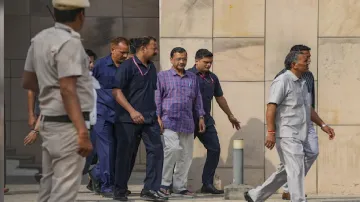The Delhi High Court pronounced its order on a plea by the Enforcement Directorate (ED) seeking a stay on the trial court order granting bail to Chief Minister Arvind Kejriwal today (Tuesday). Kejriwal did not get relief as the court stayed the bail order by the lower court. He has been in the money laundering case stemming from the alleged excise scam.
In his written submission filed on Monday, the AAP leader defended the bail order and asserted that no prejudice would be caused to the ED if he is released at this stage as he could be sent back to custody in case the high court subsequently decides to set aside the order.
Staying the operation of "the well-reasoned bail order" would amount to virtually allowing the petition for cancellation of the bail, Kejriwal argued.
A vacation bench of Justice Sudhir Kumar Jain had reserved the order on June 21 after the agency challenged the trial court's decision and put it in abeyance until the pronouncement.
The AAP national convenor, who was arrested on March 21 by the Enforcement Directorate (ED), could have walked out of Tihar jail had the High Court not granted the interim relief to the central probe agency.
The trial court granted bail to Kejriwal on June 20 and ordered his release on a personal bond of Rs 1 lakh, and imposed certain conditions, including that he will not try to hamper the investigation or influence the witnesses.
The ED has contended that the trial court’s order was “perverse”, “one-sided” and “wrong-sided” and that the findings were based on irrelevant facts.
Kejriwal neck deep in money laundering: ED to HC
ED on Monday told the Delhi High Court that the trial court order granting bail to Kejriwal was based on "perverse" findings as it did not consider the material demonstrating his "neck deep involvement" in the offence of money laundering linked to the alleged excise scam.
In a written note filed in relation to its plea seeking a stay on the trial court’s decision, the agency contended the order suffers from a "jurisdictional defect" since it was not given a proper opportunity to argue its case.
It also said the trial judge did not record her satisfaction that “there are reasonable grounds for believing that he is not guilty of such offence” as per section 45 of the Prevention of Money Laundering Act (PMLA).
(With PTI inputs)
